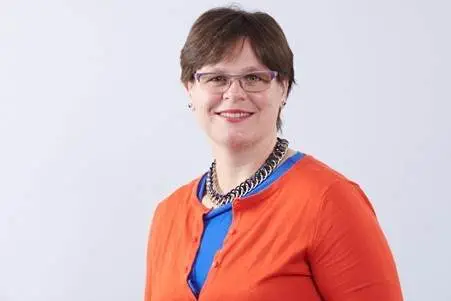Clare’s Clutter Clearing Story – But what if?

But what if….? It went round and round and round in my head with every decision I tried to make about the things in my clutter.
The thoughts and emotions were overwhelming.
What if I need it in the future? What if I lose my job, lose my income, lose my home? What if someone else needs it in the future? What about the person who gave this to me as a gift?
What will my grandmother think if I let go of this hideous coffee table that doesn’t go with any of my furniture but is the only thing I have to remember her by? (not that I had strong feelings about this particular grandmother).
What if, what it, what if…….. So many things to think about, so many possible outcomes all of which would have an emotional consequence. And I struggled with emotions. Much easier to avoid making a decision at all. Safer to keep it all.
With the benefit of hindsight which of course is 20:20 vision, I think I made or tried to make, an emotional connection to everything in my clutter because I didn’t have an emotional connection to my family.
My family didn’t ‘do’ emotions. If we think about the brain and the 2 parts – the Limbic System that is the impulsive, excitable, unpredictable and emotional part and the Pre-Frontal Cortex that’s the logic, reason, planning, decision making part, then my family was the Pre-Frontal Cortex personified.
The Limbic System didn’t get a look-in.
For us there was just one right way of doing or thinking about things. There was no point being good at school subjects that were open to discussion and debate. Tell me what’s ‘right’, tell me how to get a ‘tick’ and a ‘point’ and I’ll accept that without question. Give me hard facts and figures and I’ll make sense of them. I won’t question whatever you tell me because that’s just not what we do things in the Draper family (my maiden name).
Perhaps that’s why I struggled at University where there’s much more debate about lots of things, and although I listened, I kept quiet about my opinion because it might be ‘wrong’. If I was ever asked for my opinion, I’d say whatever I thought was the right thing to say. I’m definitely not like that anymore. 😊
Perhaps that’s why I didn’t have any life goals or dreams other than to make other people happy and not upset them. There’s the perfectionist and people pleaser gremlin! My self-worth as defined by others.
I now realise that ‘healthy’ mental health is to have a balanced use of the Pre-Frontal Cortex AND the Limbic System, not a dependency on just one.
I was 30 when I realised this and started to question my assumptions about the way the world worked. It was when I was doing my NLP training and several people commented that when I was asked for my opinion on different things I would begin the sentence with ‘my parents think/say/believe/told me…’.
‘But what do YOU think/say/believe?’ they asked me.
Wow. OK. No one’s ever really asked me what I think before. My parents certainly never did.
And as I learnt to think for myself I realised there wasn’t always a ‘right’ or ‘wrong’, and that’s when the cracks in my relationship with my parents began to appear. I no longer kept quiet and just accepted that what they said was right. I learnt to ask ‘Why?’ which wasn’t well received, I think in large part due to the fact that their beliefs and assumptions – biases as they’re known – had been passed down the family and no one had ever questioned anything or asked ‘Why?’ so they simply didn’t know ‘Why?’ themselves.
And I understand that I made it uncomfortable for my parents who are perfectionists themselves and expected to have an answer or explanation for everything instantly because that’s the way perfectionists are. It’s not OK to not know ‘Why’.
When we get uncomfortable, we become defensive, resistant and the barriers go up. When we can’t explain the ‘Why?’ it can feel like a personal attack, as if someone’s trying to catch us out.
Does any of this sound familiar in relation to dealing with your clutter?! I know this was my pattern of behaviour when I tried to deal with my clutter.
It wasn’t until I started to accept that asking ‘Why?’ is not a negative judgement on someone’s self-worth, intelligence, value or personality.
Asking ‘Why?’ is simply the foundation of understanding. When we’re clearing our clutter our foundation question is ‘Do we NEED it?’, which is often taken by the perfectionist as a suggestion that they’ve been less than perfect in keeping things they don’t need, so they scramble to justify why they’ve kept things they perhaps know deep down they don’t and won’t need for fear of looking less than perfect in the eyes of others.
My parents made the connection between me starting to ask ‘Why?’ and starting my NLP training, which led to my behaviour being explained as ‘antagonistic’ and ‘difficult’, I was ‘petulant’ and ‘impossible to talk to’. My change in character was even explained to others as being down to me doing the NLP which they considered a ‘cult’.
Ironically, I now understand WHY my parents reacted this way, and that’s OK because I asked my therapist ‘Why?’ and I got the understanding I needed. No one’s behaviour, even the anger, comes from a nasty or negative place. It’s more-often-than-not frustration or fear behind the actions or words. Goodness only knows I displayed enough of that in a very self-destructive way, both with clutter and my attempts to deal with it.
So much of my Clutter Clearing Journey was learning to ask the ‘Why?’, facing the fear of the feelings, and learning it was OK to express my emotions that were triggered by the answers.
Learning to accept and be comfortable with these unfamiliar feelings was a huge step.
It was part of the grieving process. Not for the emotional connection to the things in the clutter. For the deep emotional connection I didn’t have to family. I realised that what I’d done was try to fill the emotional void in my life with clutter and bury the emotions I did have out of shame and discomfort.
I had never made an emotional bond or connection to my parents. My practical needs were met for which I should be ‘grateful’, luxuries provided if I ‘deserved’ it. If I could justify it I could often have it, as long as my parents didn’t consider it a ‘waste’. Their decision was final. I had to make sure they knew I was grateful for everything. That emotional reassurance that I was loved unconditionally wasn’t there. I never felt like I was ‘worth’ the impractical, fun, impulsive time, energy, effort or yes, purchase.
So as I got older and I was able to provide for myself I essentially started to show myself that I was ‘worth it’ with the impractical, impulsive purchases that became my clutter.
Even many years later, at the age of 38, standing in a garden centre as my mother was paying the cashier for something she had offered to buy me, she turned to me and said ‘so what do you say?’.
That trigger of being made to feel ungrateful runs deep.
As the cashier looked at my mother and I in disbelief, I regressed to a 5-year-old and said, ‘thank you mum’. Once again I felt bad and ungrateful.
I like to think she was testing me. 10 years after clearing my clutter, could I resist rushing to the shops to buy something for myself to make me feel loved, worthy and cherished.
Absolutely.
I don’t need stuff to reassure anymore.
“Emotional Pain Cannot Kill You,
But Running From it Can.
Allow. Embrace. Let Yourself Feel.
Let Yourself Heal.“
Vironika Tuqaleva
Find out more about the Clutter Clearing Journey that Clare discovered here: https://www.clutterclearing.net/7-step-journey/

Hi CLARE, It’s purple pat in Central Michigan, USA I have been reading/ listening to a couple of your podcasts. . .I LOVE ’em ALL. BUT, recently I’ve been feeling OVERWHELMED about, not just the CLUTTER INSIDE —
But, now that it’s spring, the outside of my house is revealing how HARSH the snow blizzards, and, NOW ~ Spring wind/thunderstorms !! Thanx FOR STRESSING HOW important it is, to understand ABOUT HOW much – any TRAUMAs- [experienced/UNRESOLVED] -can IMPACT our relationships to our ‘STUFF”.
PEACE ~ dAHLINK purple pat